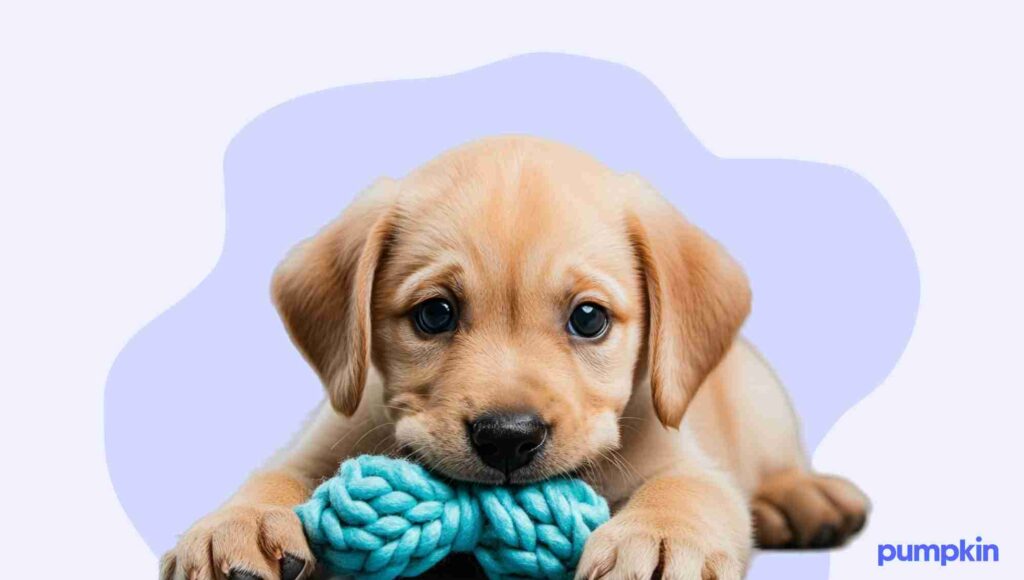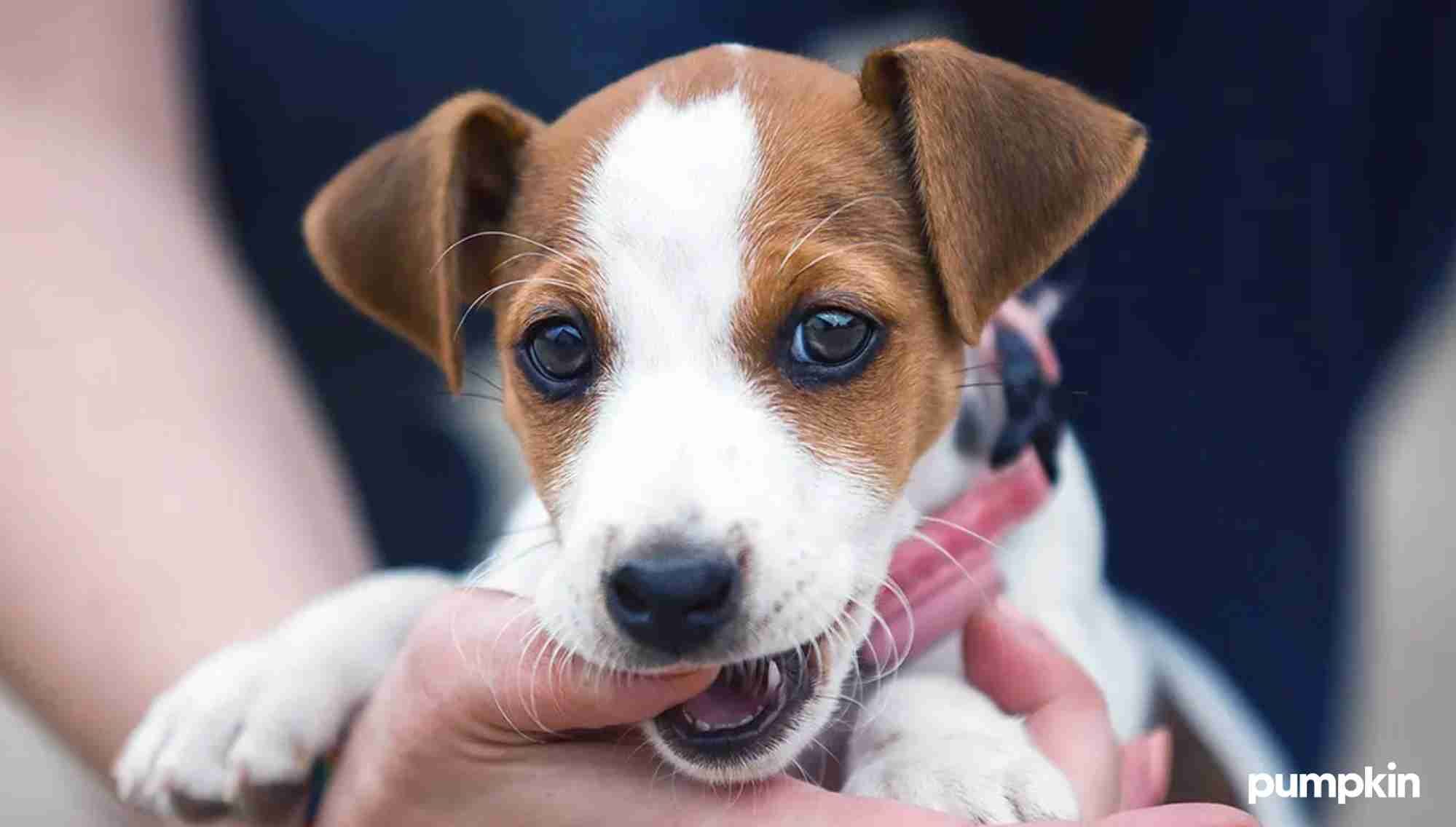Key Points
- Nipping and biting are normal behaviors for puppies.
- Biting becomes more frequent when puppies start teething.
- You can use redirection and positive reinforcement to teach your puppy not to bite as they grow and develop their adult teeth.
- When home training fails, a professional dog trainer can help you achieve positive results.
Puppy playtime is a wonderful time of bonding. Truly, it’s one of life’s greatest joys — until your four-legged friend sinks their newly formed adult teeth into your hand. Suddenly, your puppy’s playful nips start to lose their charm.
Like toddlers, puppies use their mouths to explore their world, and nipping and biting is a normal, healthy form of play for very young dogs. However, as pups shed their baby teeth to make room for adult teeth, you’ll have to teach them new ways to play. That’s why it’s important to stop nipping and biting early in the puppy training process.
This guide is full of tips to help you do just that while maintaining a positive, loving relationship with your pup — and their new chompers.
Why does my puppy bite me?
Puppies use their mouths to investigate their environment, and biting and chewing are part of that process. In addition, many young mammals engage in mock fighting with their littermates as a way to bond and practice important skills.
Puppies will also bite when they:
- Do not receive proper training or energy outlets
- Become overstimulated and need downtime
- See biting as part of playtime
- Want to soothe sore gums during the teething process
Although puppy biting is normal, it is not a behavior to encourage. As your pet grows and gets adult teeth, those playful puppy nips can become dangerous to you and others. Now is the time to teach your pet the basics of bite inhibition and when they should keep their teeth to themselves.
How long does the puppy-biting phase last?
Newborn puppies start to get their puppy teeth between 2-4 weeks, with the full set in by 6-8 weeks. Most pups get around 28 chompers, and those nips can be quite painful even when your pet doesn’t bite hard. Most breeders begin the weaning process at this time, switching pups to moist puppy food.
By 12 weeks, your puppy may start losing those baby teeth to make room for their permanent adult teeth. This is a pup’s teething phase, which can be painful at times — for them and for you. The discomfort will prompt your pup to chew on just about everything, including your fingers. Now is the time to offer your new pooch safe puppy teething toys to relieve those tender gums.
All adult teeth should be in by 6-8 months of age, ending the teething stage. If you haven’t trained your puppy to stop biting by this time, then your fingers and hands could be in serious trouble.
Tips to manage your puppy’s biting
The early weeks with your puppy provide plenty of opportunities for curbing your pet’s biting tendency. Puppies are sponges that absorb every instruction you offer, whether you want them to or not. Intentional training is vital during this time since you can guide your puppy’s behavior with gentle, positive training and direction.
Don’t wait for nipping to get out of hand before instructing your pup. The following tips can help you curb this behavior quickly and teach your pup appropriate behavior.
How to interact with a playful puppy
Never allow your puppy to chew on your hands during playtime. This teaches your pet that hands are chew toys, which encourages them to nip you and others. Puppy play should always involve safe and appropriate chew toys.
Safe chew toys should be bigger than the puppy’s mouth to reduce the risk of choking or ingestion. Puppies need softer toys than adult dogs since their teeth are more prone to damage. Look for toys constructed of durable materials that can soothe sore gums, such as toys with soft nubs. You can also freeze toys before offering them to your pet for additional relief.
Teach your puppy bite inhibition
Bite inhibition training teaches your puppy to use their mouth gently. Dogs usually learn this lesson while playing with other pups, as a yip or yelp will let the biter know they have gone too far. Puppies will often end play after a particularly painful nip, teaching the other dog that if they bite too hard, playtime is over.
You can also use this technique to teach your puppy bite inhibition. Allow your pup to mouth you gently, but if they bite, let out a high-pitched yelp and move your hand away. If the noise doesn’t stop your pet, try a short time-out in their safe place to show that biting ends their playtime. If your puppy stops nipping, be sure to give them plenty of praise for good behavior.
Provide lots of mental stimulation
Mental stimulation is important for your puppy’s growth. Take your pup out for around 20 minutes of free time at 8-10 weeks of age, increasing the time as the puppy gets older. Include a potty break, training session, play session, and second potty break during that 20 minutes, then return your pet to their crate for a nap afterward.
Training might include name recognition, coming when called, and other simple commands. Mix in some playtime with a toy — a ball, a tug rope, or a puzzle toy. Your puppy will be ready for some quiet time after all that activity. Remember, young dogs need plenty of sleep.
Use redirection to curb biting behavior

When your puppy does start to gently nip at you, redirect them to an appropriate chew toy. Choose an item that will keep your pup engaged so they don’t redirect back to you. If your pet nips at you again, place them back in their crate for downtime. Repeat this pattern until your four-legged friend stops biting during play or as a way to get your attention.
Don’t be afraid to be firm with your new puppy when biting gets out of hand. A well-trained puppy will grow into a happy, well-behaved adult dog.
Calm an overstimulated puppy
If the puppy is too excited or biting hard, put them away quickly but calmly in a safe place. You need to let your pup know you will not engage with them when they bite.
Leave the puppy in timeout until they have calmed down fully. Sometimes your puppy may take a nap. If they do, leave them alone until they wake up.
Use positive reinforcement to stop unwanted behavior
Positive reinforcement training uses rewards to encourage good behavior, rather than punishment for unwanted actions. Because puppies respond well to treats or praise, this approach can be highly effective. You can use positive reinforcement for puppy potty training, mealtime manners, and proper play, including no biting.
When you begin training, offer your pup a reward every time they perform the behavior you want (continuous reinforcement). Over time, reward them four out of five times (intermittent reinforcement). Slowly decrease the praise until your pet behaves well with only verbal praise.
Remember that rewards don’t just mean yummy treats. Puppies also respond well to praise and affection.
Teach kids the best way to play with a new puppy
Proper puppy training involves teaching both your puppy and your kids the correct ways to interact. Teach your child to treat your new pet gently — never pulling on ears or the tail. Always supervise interactions between the two at first. Likewise, teach them not to tug too hard when playing tug-of-war.
Consider a puppy class
When positive reinforcement and timeouts aren’t working, you may need to call in the professionals. Many energetic dog breeds are happiest when they are fully trained. Proper training will help your pooch become a welcome member of your family.
Working with a dog trainer or enrolling your pup in an obedience class can help your dog and your family. Dogs crave training, and they take their cues from you — the leader of the pack.
Puppy training requires time and consistency, but the rewards are far-reaching. As your new dog grows up, you need to be prepared for any unexpected health concerns that may arise. Pumpkin Dog Insurance plans can help you with the costs of eligible vet bills if your dog gets sick or hurt in the future. That way, when the unexpected happens, you can focus on caring for your pet and not on expensive bills.




